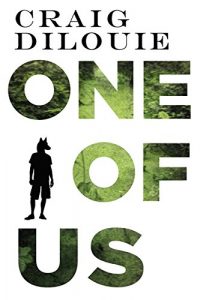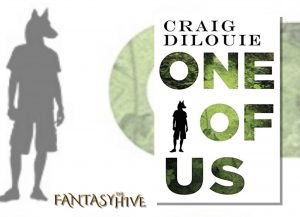ONE OF US by Craig DiLouie (BOOK REVIEW)
“Let’s start with the plague kids,” Mr Benson said. “What do ya’ll think about them? Tell the truth.”
“They ain’t human. They’re just animals.”
 Craig DiLouie is an author of popular thriller, apocalyptic/horror, and sci-fi/fantasy fiction. DiLouie’s novels have been praised for their strong characters, action, and gritty realism. Each book promises an exciting experience with people you’ll care about in a world that feels real.
Craig DiLouie is an author of popular thriller, apocalyptic/horror, and sci-fi/fantasy fiction. DiLouie’s novels have been praised for their strong characters, action, and gritty realism. Each book promises an exciting experience with people you’ll care about in a world that feels real.
His work has been nominated for major literary awards such as the Bram Stoker Award and Audie Award, translated into multiple languages, and optioned for film. He is a member of the HWA, SFWA, International Thriller Writers, and IFWA.
Craig DiLouie’s 2018 novel One of Us, is a harrowing confrontation of human exploitation, intolerance, enforcement of normalcy, and heart-breaking resilience all built into an uncomfortably familiar alternative world. The narrative is engaging and addictive, with a momentum that, as the Literary Titan says, “verges on perfection.” This is a novel which, many reviewers agree, is difficult to put down, brimming with characters that make you ache with empathy and guilt.
The year is 1984, and the people of DiLouie’s world live as one might expect. Adults got to work, children go to school, and families eat dinner together before they go to bed. However, lurking on the outskirts of cities and towns are isolated ‘Homes,’ and living in these homes there are Monsters.
“Monsters, maybe. But does a monster have to be evil?”
In 1968, there was an incident. “A bacterium caused the plague generation.” The plague was a sexually transmitted disease called teratogenesis, which refers to ‘a prenatal toxicity characterized by structural or functional defects in the developing embryo or foetus.’ Those who contracted the plague would not show any noticeable symptoms, you would only realise you were infected when you had a baby, as it would be born a monster. 16 years since the first plague children were born and there is no cure. There is a test to see if you have contracted the disease, but the only sure-fire way to remain unaffected or refrain from passing it on, is abstinence, and if you are infected and become pregnant, abortion is mandatory.
But what is wrong with the plague kids? Why are they called monsters?
The answer to this is simple: Fear.
“They call you Dog.”
Dog is plague kid. When he was born, the doctors new immediately because he did not look like a ‘normal’ baby. When an infected child was born there would be something unexpected, a ‘defect’ or extra non-human-type attributes, highlighting their infection. Although Dog was born of a human woman, he resembled a dog, and so he was branded as a monster and taken away. The “Bureau of Teratological Affairs” took him and millions of others to the ‘Homes,’ out of sight and out of mind of the ‘normal’ people. As Dog grew up amongst other plague kids, the teachers tried to force the children to behave like ‘normal’ children. Dog growls when he talks but must take ‘special care’ to ‘form each word right,’ so other people can understand and are not frightened by him. He was forced to walk on two legs when he was younger, because walking on ‘all fours,’ ‘ain’t allowed.’ the Teachers in the Home tried to repress or remove anything that made the children different, other, or ‘monsters,’ enforcing an agenda of ableism and normalcy engendered by a cold and uncanny society. The Homes were run as places trying to ‘cure’ or help the plague generation, but rather than help the children, all they promoted was fear and forced submission with every passing day.
“Dog remembered how he used to lope around on all fours when he was a little kid. The teachers cured him of it”
In their segregation and isolation, the plague children are treated poorly. The teachers and Bureau who care for the children study them closely, unpicking the familiar threads of humanity trying to find similarities and differences. They are clearly scared of them, but should they be? After a life of being repressed, hidden away, and forced into manual labour on a farm, what would the plague children do to escape? Would they even want to?
“Trying to find out if they were still human. Did they want to hurt people, ever have carnal thoughts about normal girls and boys, that sort of thing.”
DiLouie shines a spotlight on the darkest parts of our society. Namely, the problematic and negative ideological effects of ‘normalcy,’ enforced through the almost unattainable projection of a ‘normal idea.’ The effects of normalcy are littered through film, fiction, art, and day to day life, and DiLouie (amongst others like Kazuo Ishiguru and Raymond Antrobus) force the reader to confront the social construct of ‘normalcy.’ DiLouie’s novel exposes negative effects of society so suddenly, that you almost get whiplash.
“I can’t imagine why the doctors let them all live. It would have been a mercy too let them die”
Much like Lennard J. Davis’s essay ‘Enforcing Normalcy,’ and other works under the category of identity studies and disability studies, DiLouie uses his novel to force us to confront societies ideology concerning normalcy and the ‘normal body,’ addressing how this ideology stigmatizes any divergence from that norm, even though all bodies have ‘variation.’ DiLouie exposes how problematic and damaging this negative ideological attitude can have on those victimised.
I have not heard much about DiLouie’s One of Us, and only came across it by chance in ‘News from Nowhere,’ on Bold Street, in Liverpool. This novel deserves to be analysed, studied and admired for the countless concepts of identity and psychoanalytical confrontations DiLouie makes within its pages. I can promise you heart-wrenching, guttural crying as you read this novel. I can promise you shock and grief. I cannot promise you that you will come out of reading this text as a better person, but I really hope that you do.
“He couldn’t help thinking this was how it was always meant to be.
The world the way God intended it.
People of all kinds sharing a meal. Smiling at the same joys.
Fighting for a common cause. Dreaming the same dreams.”
Referenced:
Craig DiLouie, One of Us (London: Orbit, 2018)
Lennard J. Davis, ‘Enforcing Normalcy,’ in The Norton Anthology, Theory and Criticism, ed. By Peter Simon, 1st Ed (United States of America: W. W. Norton & Company, 2001), pp. 2171-2191

